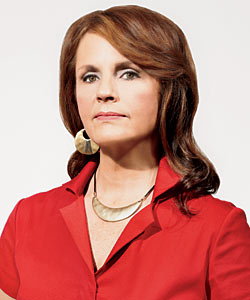Interview by Ben Goldberger

After a long career in public service, you were working for real-estate developer John Buck when the director of the NATO host committee resigned last October. Why did you take the job?
I have a huge passion for the city, and it’s a unique opportunity to be able to show it off to the world. Having a lot of relationships that we built up during the Olympic bid [Healey led the city’s effort to host the 2016 Games], it was a natural [fit]—and for a short period of time—so I said yes.
How did large-scale events become your niche?
I don’t really know. Some people just have the ability to manage an organization and build a team. It’s all about identifying opportunities for people.
You spent four months coordinating logistics for the back-to-back NATO and G8 summits. Then in March the White House suddenly moved G8 to Camp David. How did that feel?
It was a tough week. The toughest part was explaining to people that the impact, for what we’re planning in the city that weekend, is minimal. Camp David is obviously a very, very small venue. There are eight leaders, a handful of staff for each. They’re taking a 24-hour detour to Camp David on their way to Chicago [for the NATO summit, which is far larger, with 7,500 delegates expected].
Protest leaders have called the G8 relocation a victory. Did it have anything to do with potential demonstrations?
I can guarantee you the president of the United States doesn’t decide to invite world leaders to Camp David because of a handful of protesters.
What do you say to people who predict a repeat of the violence at the 1968 Democratic Convention?
You know, that was over 40 years ago. The world has changed a lot. We have the best police department in the country—it dealt with the Occupy movement better than any city in the country—[and it has] been preparing for this for a number of months. And I think—obviously recognizing that people all over the world have the right to express their opinions—we believe in free speech here in Chicago. Everybody’s very ready for it.
Aside from the hotels and restaurants that NATO delegates will patronize, what is the financial benefit for the city and its residents?
We’re working to quantify that right now. The University of Illinois did a preliminary analysis with some data given to them by the convention and tourism bureau, but that is old and really doesn’t quantify the impact. [UIUC economists estimated the short-term effect at $150 million.] Because of the summit being announced here, other things have followed: The Nobel Peace Laureates decided to have their summit here [in April], and we had OECD-C40, which was a meeting of mayors from all over the world.
Traffic will be blocked in places, and some business owners are worried about property damage. Why should Chicagoans be excited about the summit, given these headaches?
Traffic headaches, you know, we deal with it all the time. The president is here a lot. There’s always that kind of rolling traffic closure. Unfortunately, some unscrupulous security firms and board-up companies have gone around—I’ve heard this from people—trying to solicit business. It’s a great country, right? Everybody can go out and try to make money. But it scares people, and I think our job is to get that fear down. This is an incredibly unique time for Chicago. People should embrace it.
You have worked closely with mayors Richard M. Daley and Rahm Emanuel. How are their styles different?
I wasn’t here when Mayor Daley first took office [Healey was his chief of staff from 2007 to 2009]. But I think they’re very much cut from the same cloth. They’re both strong individuals.
When you get time off, how do you spend it?
I have a horse, and I ride. It’s been a passion all my life. [Healey is 52.] I always find time.
If you could redo the Olympic bid, what would you change?
I don’t think I’d change anything. We had a great bid. The Games have never been to South America, and when Rio did that presentation, it was very compelling in the [International Olympic Committee’s] eyes. Everything is there should the city ever decide it wants to do it again.
* * *
HOSTS WITH THE MOST
Healey tapped a diverse group of Chicagoans to help welcome the NATO delegates to town. The 70-person committee includes:

David Vitale
president of the Chicago Board of Education

Alexi Giannoulias
former Illinois state treasurer

Andrea Zopp
well-connected president of the Chicago Urban League

Eric Whitaker
Obama pal and U. of C. Medical Center vice president

Carlos Tortolero
founder and president of the National Museum of Mexican Art

Yoko Noge-Dean
jazz singer
Juan Rangel
charter school group operator and Emanuel confidant
Nora Daley Conroy
daughter of Richard M. and the director of outreach at Metropolis Strategies



